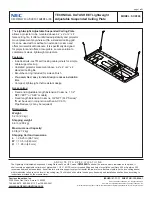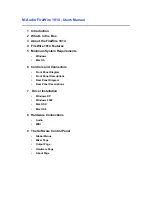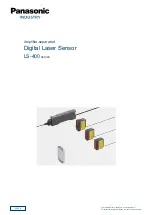
Indoor Sensor WGTH-UP
1
Indoor Sensor WGTH-UP
• Version: 01.04.2020 • Technical changes and errors excepted. • Elsner Elektronik GmbH • Sohlengrund 16 • 75395 Ostelsheim • Germany • www.elsner-elektronik.de •
Technical Service: +49 (0) 7033 / 30945-250
EN
Indoor Sensor WGTH-UP
For WS1 Color/Style, (KNX) WS1000 Color/Style
Technical specifications and installation instructions
Item numbers 20550, 20551
1.
Description
The WGTH-UP Indoor Sensor transfers temperature and humidity to the control sys-
tem via radio. Several separate WGTH-UP can be taught to one control system. The
teaching is described in the chapter “Learn wireless connections” (manual of the
control system).
The WGTH-UP Indoor Sensor consists of the housing, the sensor PCB/base plate
and a frame. As an alternative to the supplied frame, a frame of the switch series
used in the building may be used. You will additionally require a junction box (Ø 60
mm, 42 mm deep, not included in scope of delivery).
For power supply (11…28 V DC), e. g. 12 V DC can be tapped from the connection
board of the control unit (multifunctional input).
2.
Installation of the indoor sensor
2.1.
Installation location
The interior sensor is to be installed flush to the wall surface in a junction box (Ø 60
mm, 42 mm deep). The ideal installation hight is approx. 1.40 m above the ground.
When selecting an installation location, please ensure that the measurement results
are affected as little as possible by external influences. Possible sources of interfe-
rence include:
•
Direct sunlight
•
Drafts from windows and doors
•
Draft from ducts which lead from other rooms to the junction box in which the
sensor is mounted.
•
Waste heat from the control unit (when mounted above the display)
•
Warming or cooling of the building structure on which the sensor is mounted,
e.g. due to sunlight, heating or cold water pipes
•
Connection lines which lead from warmer or colder areas to the sensor
Temperature variations from such sources of interference must be corrected in the
control unit menu in order to ensure the specified accuracy of the sensor (see ma-
nual chapter on Wireless connections > Status).
The indoor sensor must only be installed and used in dry,
interior spaces. Avoid condensation.
2.2.
Layout
2.3.
Rear view
2.4.
Installation
First install the junction box. Seal the inlet tubes in order to prevent drafts.
Connect the power /- to the connector terminals provided for this purpose
on the sensor board. Then screw the board/base plate onto the socket. Ensure that
the front side with the writing „TOP“ is directing out of the wall and that the arrows
point towards the top.
Position the frame of the switching programme. Insert the housing of the sensor
firmly onto the base plate using the catches, so that the housing and frame are fixed
together.
3.
Notes on mounting and commissioning
Never expose the device to water (e.g. rain) or dust. This can damage the electro-
nics. You must not exceed a relative humidity of 95%. Avoid condensation.
4.
Establish radio connection with WGTH-UP
1. Bring the control unit into learning readiness mode (note chapter
Learn wireless
connection
in the manual).
2. Press the programming button at the WGTH-UP sensor
3. Pay attention to the report of the control unit (“Device successfully learnt”).
5.
Installation notes
Installation, testing, operational start-up and troubleshooting should
only be performed by an electrician.
CAUTION!
Live voltage!
There are unprotected live components inside the device.
•
National legal regulations are to be followed.
•
Ensure that all lines to be assembled are free of voltage and take
precautions against accidental switching on.
•
Do not use the device if it is damaged.
•
Take the device or system out of service and secure it against
unintentional use, if it can be assumed, that risk-free operation is
no longer guaranteed.
The device is only to be used for its intended purpose. Any improper modification
or failure to follow the operating instructions voids any and all warranty and gua-
rantee claims.
After unpacking the device, check it immediately for possible mechanical damage.
If it has been damaged in transport, inform the supplier immediately.
The device may only be used as a fixed-site installation; that means only when as-
sembled and after conclusion of all installation and operational start-up tasks and
only in the surroundings designated for it.
Elsner Elektronik is not liable for any changes in norms and standards which may
occur after publication of these operating instructions.
6.
Technical specifications WGTH-UP
Fig. 1
1 Openings for air circulation
2 Opening programming LED
4 Opening programming but-
ton for configurating the de-
vice
5 Openings for air circulation
(BOTTOM)
3
1
2
4
Fig. 2
1 Connection for power sup-
ply 11…28 V DC (+/-)
1
Housing
Plastic (partially painted)
Colours
• White, glossy (similar to RAL 9016 Traffic
White)
• Matt aluminium
Installation
Flush-mounted (installed in wall within junc-
tion box
Ø 60 mm, 42 mm deep)
Protection rating
IP 20
Dimensions
Housing approx. 55 × 55 (W × H, mm)
Installation depth approx. 15 mm
Backplate approx. 71 × 71 (W × H, mm)
Total weight
approx. 50 g
Ambient temperature
Operating -20…+70°C, Storage -55…+90°C
Ambient air humidity
max. 95% RH, avoid condensation
Operating voltage
11…28 V DC
Current
max. 35 mA
Data output
Wireless
Wireless frequency
868.2 MHz
Protocol
Proprietary protocol (Elsner RF)
Temperature measure-
ment range
-20…+70°C
Resolution (tempera-
ture)
0.1°C
Accuracy (temperature)
±0,6°C at -20...-10°C
±0,5°C at -10...+65°C
±0,6°C at +65...+70°C
Humidity measurement
range
0…95% RH
The programming button is situated be-
hind the right lower opening of the hou-
sing.




















